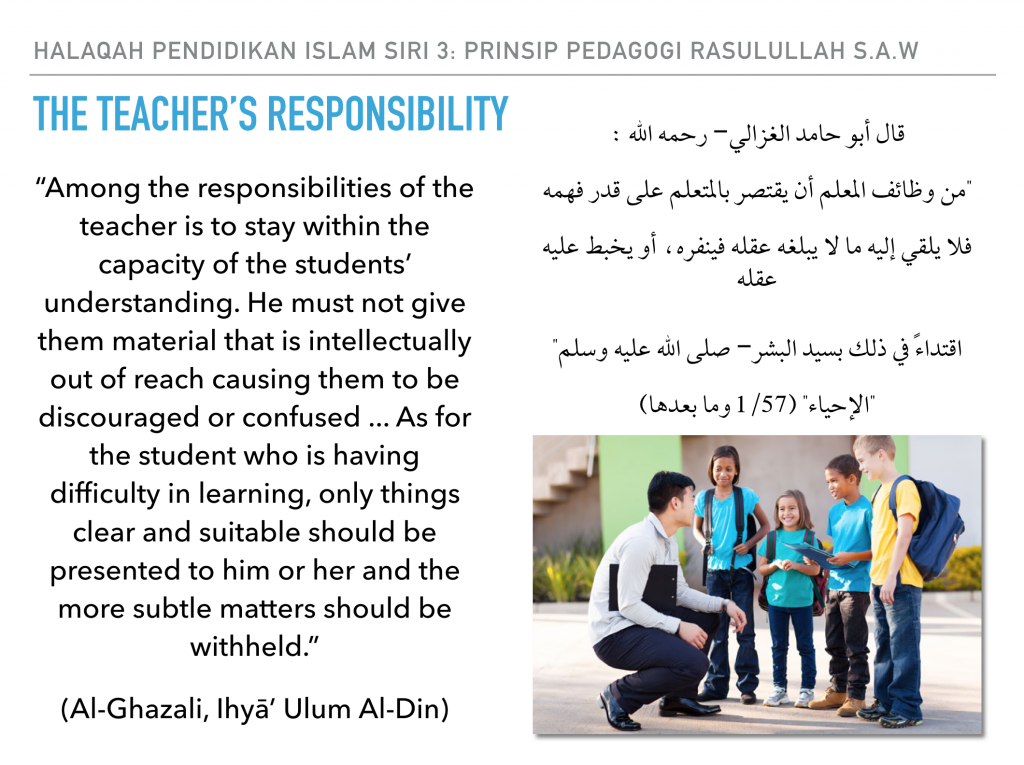
To stay within the capacity of the students’ understanding.
Assalamualaikum WBT.
Going through the traditions of our beloved Prophet Muhammad PBUH, I question myself, how different the way the Sahabah learnt from and with Rasulullah PBUH, compared to the way we and our students learn about Islam today? And how much the differences influence the outcome?
Jundab Ibn Abdillah al-Bajaly said, “We learned iman (faith) and then we learned the Quran and it increased our iman.”
Abdullah ibn Umar said, “We lived during an instant of time in which one of us would receive faith first before receiving the Quran and when the surahs were revealed we would learn what they permitted and what they prohibited and what they forbade and what they ordered and what should be the stance towards them. But I have seen many men from whom one is given the Quran before iman and he reads it from the opening of the Book to its closing and he does not know what it orders and what it forbids and what should be his stance towards it. He is like someone who is just throwing out dates [i.e., he does not get any benefit from his recital].”
The importance of distributing the content based on students’ aptitude, pace and learning style is obvious. But how that can be done effectively?
In our country, this is perhaps the most critical part we face in public education where students now are learning something beyond their age capacity. Mathematics for Grade 1 students is full of texts, concepts, while students at that age are struggling with basic reading and writing. In language, students are taught to learn proverbs and idioms which majority are metaphorical while the abstract thinking has not yet developed to become part of the children’s cognitive.
This issue is critical more on younger kids.
Dr. Leonard Sax mentioned in his book Boys Adrift,
“… It now appears that the language areas of the brain in many five-year-old boys look like the language areas of the brain of the average three-and-a-half-year-old girl… Trying to teach five-year-old boys to learn to read and write may be just as inappropriate as it would be to try to teach three-year-old girls to read and write. Timing is everything in education as in many other fields. It’s not enough to teach well. You have to teach well to kids who are ready to learn, kids who are developmentally “ripe’ for learning…”
I read in the American Journal of Play, an article titled The Decline of Play and the Rise of Psychopathology in Children and Adolescents by Peter Gray. The article said: “PLAY functions as the major means by which children:
- develop intrinsic interests and competencies
- learn how to make decisions, solve problems, exert self-control, and follow rules
- learn to regulate their emotions, make friends and learn to get along with others as equals; and experience joy. “
Doesn’t Islam has something to say about the importance of play? Aren’t these important to our children?
So, even in Islamic schools, we eagerly want to make our children ‘MUSLIM’ before developing them as ‘HUMAN’. We wanted them to memorise the Quran at young age and at the same time hoping them to be learn solat, even Hajj, fast in Ramadan as early as possible, knowing the rule of Tajweed, while looking into the practice of sahabah during the time of the Prophet PBUH, ‘education’ was never anything like that.
TRANSFORMATION WE INITIATED AT SCHOOL
In our school, we overhaul our curriculum and instruction from bottom to top. We want to offer equity in its true sense of meaning to as many students as possible. Our placement test is mainly to make sure that applicants have the right attitude at his or her age to fit into the surrounding in our school, without restricting the qualification to the national examination result done during their primary school at the age of 12. In order to achieve that, these are some of the changes we made:
- We change annual system into semester, and therefore subjects are made into smaller units within a shorter duration of learning to make differentiated instructions realistic.
- We make learning in our school divided into three types of program:
- Transitional semester
- Foundation studies
- IGCSE preparatory classes.
- In the transitional semester we offer limited subjects mainly on developing skills in learning, literacy and communicating the understanding. Subjects including Malay, English and Arabic in Listening, Reading, Speaking and Writing, Introduction to Islamic Studies, Study Skills and Da’wah Islamiyyah. Especially in study skills, students are assisted to identify their learning style, their pace and aptitude. Findings are discussed with all teachers for them to prepare to embark with full academic subjects in the forthcoming semesters.
- In classroom, teachers are required to distribute the 50 minutes block into small units in each session so that they will allocate 10 minutes personalisation to attend small minority students who need personal attention.
- We initiate 3 exit points for our students based on their aptitude:
- IGCSE for the academic exit point.
- BTEC for vocational exit point (at research and discussion level).
- Malaysia Certificate of Tahfiz for ‘Islamic vocational’ exit point (also at research and discussion level).
Everything is still very new. We need to work hard to bring parents to consider supporting their kids choose the path based on their aptitude, without comparing kids to other siblings and other students.
The most important thing is, no matter what our students want to be and become in future, they always the khalifah of Allah who serve people around them with goodness lillāhi ta’āla.
HASRIZAL
kmss.edu.my